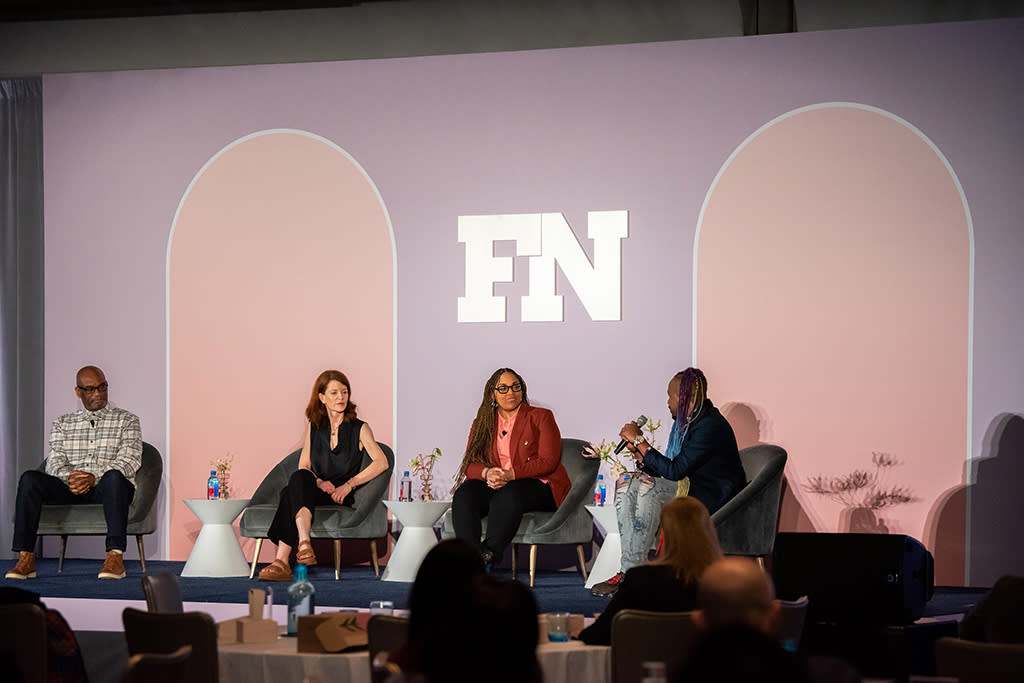‘We Have a Long Way to Go’: DEI Experts Take the FN CEO Summit Stage to Offer Sage Advice on How to Ignite Real Change

It’s been nearly three years since the murder of George Floyd — a moment that sparked a racial reckoning across America and inside every C-suite. But has the industry become complacent on DEI?
A panel of top diversity experts took the FN CEO Summit Stage in Miami on Thursday to offer their insight on where things stand now, what’s worked — and what hasn’t.
More from Footwear News
Tommy and Dee Hilfiger Talk Creative Partnership and the Power of Family at the 2023 FN CEO Summit
New Balance CEO Joe Preston Talks Building Brand Heat and Onshoring at FN CEO Summit 2023
Former Nike DEI Chief Jarvis Sam — founder and CEO of Rainbow Disruption — moderated the all-star panel, which brought together Dr. Dwayne Edwards, founder, Pensole Lewis College of Business and Design; Cheresse Thornhill-Goldson, Director of Design Education & Growth, S.E.E.D., Adidas; and Anne Spangenberg, President, Fashion Lifestyle Group, Deckers.
Interestingly, all four executives spent time at Nike during their careers — and each of them has had a unique trajectory.
“I started my career about 16 years ago at Nike, and I just wanted to design footwear. I grew up here in South Florida, so I wasn’t aware of this space and the intersectionality I held. I was the first woman of color to design basketball shoes at Nike.” recalled Thornhill-Goldson, a Black woman.
Fast forward to today, and the executive is creating opportunities for women and women of color to get in the door at Adidas, and the industry. “When we started, there were 10 women of color across all brands,” she remembered. “To think we were not on the creation side was jarring. We brought in women of color who would have otherwise not been in this space. We know there is a path into design, which is riddled with tons of student loans. There’s a huge portion of our society who just doesn’t have access.”
Edwards, a veteran designer who decided to make the leap into education when he founded Pensole in 2010 and later launched the Detroit-based college, said that, by his count, there are still only about 30 Black women across footwear, and only 250 Black designers period.
“The footwear industry has been involved in DEI for 50 years, but just through a different lens,” he said referring to athletic powerhouses’ longtime endorsement deals with top athletes from Walt “Clyde” Frazier at Puma to Michael Jordan at Nike — and later with creators like Virgil Abloh and Salehe Bembury. And of course, a large percentage of sneaker consumers are people of color.
“The companies have only seen us through this one DEI lens of talent or consumer. My goal was just to level the playing field, and create the same starting line for everyone,” Edwards said. “We can help our industry see these young kids who are in middle school, and in high school, with no art access available to them. [It’s gone] in inner cities. These kids are growing up with no real path, no real visibility to what’s possible.”
Spangenberg said she’s learned that “building communities and the intersectionality of those communities coming together” is incredibly valuable. “It’s the idea of thinking about your internal constituents and communities, and also those you can partner with externally, whether those are consumers or influencers that can help make you better,” she said.
When it comes to engaging diverse groups, “authenticity matters so much,” according to Sam.
He noted that on the same day as the summit, the Republican-controlled House of Representatives ushered through legislation that would ban transgender women and girls from competing in sports designated for women. “The transgender community is on trial,” he said. “Our mission centers around redefining who is represented in these spaces, and equipping them with talent so they are competitive as they look to navigate their careers and workspaces.”
For Spangenberg, one of the big things that attracted her to Deckers after leaving Nike was the idea of “come as you are,” a philosophy championed by CEO Dave Powers.
“It’s that idea of being able to fly your own flag. Coming in to the footwear and sports business, I felt like I had to be a student of the industry,” she recalled. “I had to show up a certain way to gain traction and validity with the partners around me. That’s changed over time.”
The executive cited Decker’s work with The Trevor Project, which provides 24/7 crisis support services to LGBTQ young people. “We are constantly learning from our consumer community and constantly reaching out,” Spangenberg said.
While partnerships with diverse communities are key, the industry must work together more effectively, the speakers said.
“There’s an opportunity for us to think about how we can partner in this type of work, and really push it forward,” Thornhill-Goldson said. “We’re now in 2023, and I’ve seen the desire for brands to make headway in this space dissipate. This is an opportunity for us to reignite this energy.
“We have a long way to go,” Edwards said, noting that companies only started making efforts in the last decade to diversify their workforces.
The leader’s big ask of the industry? “Remove the word initiative from everything related to DEI. Why can’t it be the way you do business and not an initiative that has an expiration date. There were a lot of promises made in 2020 with expiration dates. If you were really authentic, it would be just the way you do business,” he said.
Best of Footwear News
How Shaquille O'Neal Owns a Portion of Elvis Presley's Royalties
Black Fashion Leaders Spotlight the Rising Stars You Need to Know
Marc Jacobs, Kim Kardashian & More Honor Late Fashion Icon André Leon Talley
Sign up for FN's Newsletter. For the latest news, follow us on Facebook, Twitter, and Instagram.


